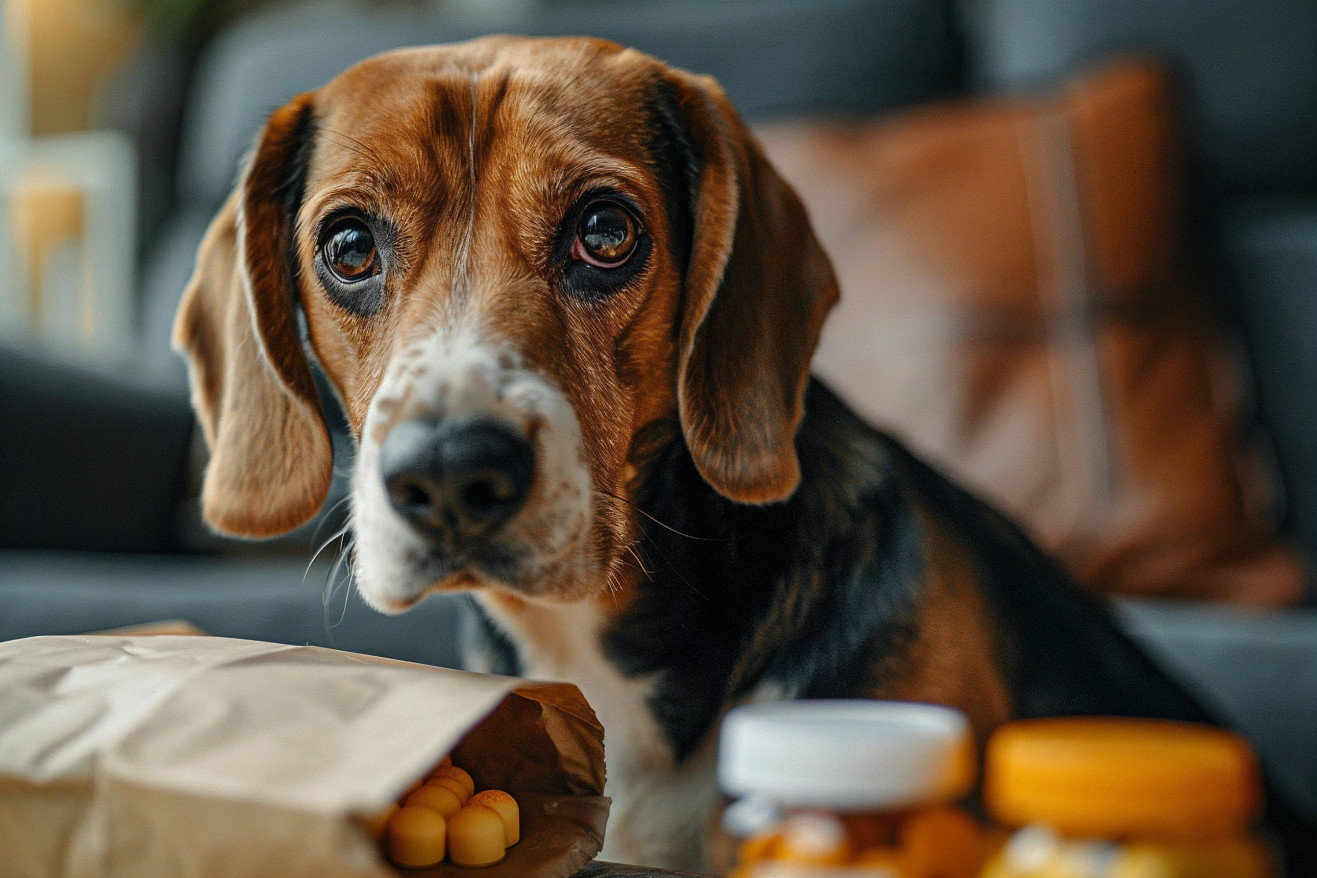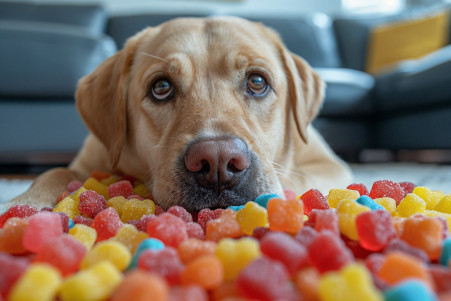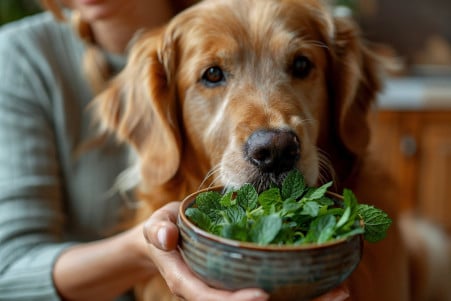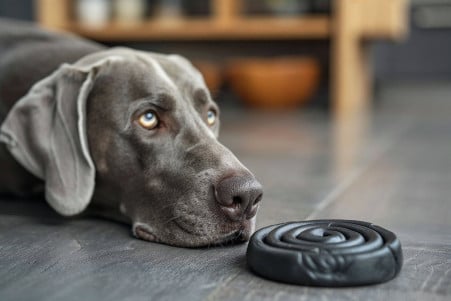Can Dogs Have Cough Drops? What Pet Parents Should Know
20 April 2024 • Updated 19 April 2024

If you've ever wondered if the cough drops in your medicine cabinet are safe to give to your dog or if the menthol in them is toxic, you're not alone. Although cough drops can be helpful for humans dealing with a cold or a sore throat, many of the active and inactive ingredients in them, including menthol, benzocaine, and xylitol, can be harmful to dogs. As a result, it's generally not a good idea to give your dog cough drops or other human medications that aren't specifically formulated for pets.
To help pet parents better understand the risks, this article will review research by veterinary toxicologists and other scientific studies that have investigated the impact of some of the most common ingredients in cough drops on dogs. By the end, you'll know which ingredients are most worrisome, what signs to look out for, and what to do if your dog accidentally ingests any of these substances. This way, you'll be better equipped to make decisions about giving your dog any kind of over-the-counter medication.
Are cough drops bad for dogs?
Signs of Cough Drop Poisoning in Dogs
While cough drops may be a common staple in your medicine cabinet, they can be very dangerous for your furry friend. While vomiting and gastrointestinal upset are some of the initial signs that a dog may have gotten into cough drops, the real danger comes from some of the most common ingredients in cough drop formulations.
Xylitol, a popular sugar substitute, is highly poisonous to dogs and can cause life-threatening hypoglycemia (low blood sugar) within 30 minutes of ingestion. Signs of xylitol poisoning include weakness, lethargy, tremors, seizures, and ataxia (loss of coordination) due to the sudden release of insulin that xylitol causes. Unfortunately, even small amounts of xylitol can be deadly.
Other ingredients like menthol and eucalyptus oil can cause respiratory distress in dogs, including tachypnea (rapid breathing) and dyspnea (difficulty breathing). Meanwhile, benzocaine, which is a local anesthetic found in some cough drops, can cause methemoglobinemia (a type of anemia) if ingested in large amounts.
In more serious cases of cough drop poisoning, especially when xylitol is involved, dogs can develop liver damage or liver failure. This is why it’s so important to keep all human medications, including cough drops, out of your dog’s reach. If your dog does get into your cough drops, make sure to get them to the vet right away.
What to Do If Your Dog Has Eaten Cough Drops
If you think your dog may have eaten cough drops, it is important to act quickly. The Pet Poison Helpline recommends that the first thing you should do is try to figure out exactly what the product is and what it contains, especially if it has xylitol in it. This will help the professionals determine the best course of action.
Call your vet immediately or get in touch with the Pet Poison Helpline for help. The ASPCA says not to induce vomiting unless you are told to do so because it can make things worse. Instead, watch your dog for signs of vomiting, weakness, or rapid breathing.
You should also be ready to take your dog to the vet for an exam and treatment. Bring the packaging or a sample of the cough drops with you to the vet so they can determine what the product contains and decide on the best course of action. Getting your dog to the vet as soon as possible is important to prevent or reduce the risks associated with eating cough drops.
Safe, Vet-Approved Options to Help Dogs With Coughing
Dextromethorphan is a cough suppressant that can be prescribed by a vet to dogs with a chronic cough, according to the Wedgewood Pharmacy. It works to temporarily suppress coughing in dogs with bronchial or tracheal irritation. That said, as Dr. Michael Stone from the Daily Paws points out, it’s important to avoid human cough medicines, as they often contain xylitol, which is toxic to dogs.
For a more natural option, the homeopathic product HomeoPet COUGH is a homeopathic product that may help relieve coughing symptoms in pets in a safe and natural way. According to the HomeoPet website, the product is made with 100% natural ingredients and can be used in dogs, cats, and other animals under the supervision of a vet.
The Naturalistic Hound also suggests natural remedies like honey, chicken broth, and steam therapy to help dogs with a mild cough. However, it’s important to note that these remedies should be used in conjunction with professional medical care, as vets agree that the best way to help dogs with a cough is to treat the underlying cause, whether it’s kennel cough or asthma.
In more serious or chronic cases of coughing, the Merck Veterinary Manual explains that vets may prescribe antitussive drugs like codeine or butorphanol. While these drugs can be effective at suppressing coughs, they also come with a risk of side effects that need to be managed.
Home Remedies and Self-Care for Coughing Dogs
Honey is a natural and safe home remedy for dogs with a mild cough, and it has been shown to have antimicrobial and anti-inflammatory properties. Prana Pets suggests adding a teaspoon of honey to your dog's food or water to help soothe their cough. However, it should not be given to puppies under one year of age.
Steam therapy, which can be provided by running a hot shower or using a humidifier, can help break up mucus and make it easier for your dog to breathe. The Whole Dog Journal suggests taking your dog into the shower with you to help moisten their airways and provide pain relief.
Make sure your dog stays hydrated with chicken broth or bone broth to help thin mucus and promote healing. The Rover.com also recommends making sure your dog gets plenty of fluids to help keep their throat moist and reduce irritation.
Make sure your dog gets plenty of rest and avoid using a collar when walking your dog to avoid putting pressure on their throat and causing them to cough. Make sure your dog gets plenty of rest and avoid exposing them to smoke and other strong odors, which can make their cough worse, according to the Whole Dog Journal.
Conclusion: Always Put Your Dog's Safety and Well-being First
Cough drops made for humans should never be given to dogs because they can have serious, and even life-threatening, side effects. If your dog has eaten cough drops, it's important to act quickly and get them to the vet to prevent or minimize any potential complications. While natural remedies and supportive care can provide temporary relief for mild coughing, it's important to get to the root of the problem with a proper diagnosis and treatment.
Always consult your vet and follow their advice to ensure your dog's cough and other health issues are properly managed. By knowing the dangers of cough drops and finding other solutions, dog owners can make sure they're making the best choices for their pets.


